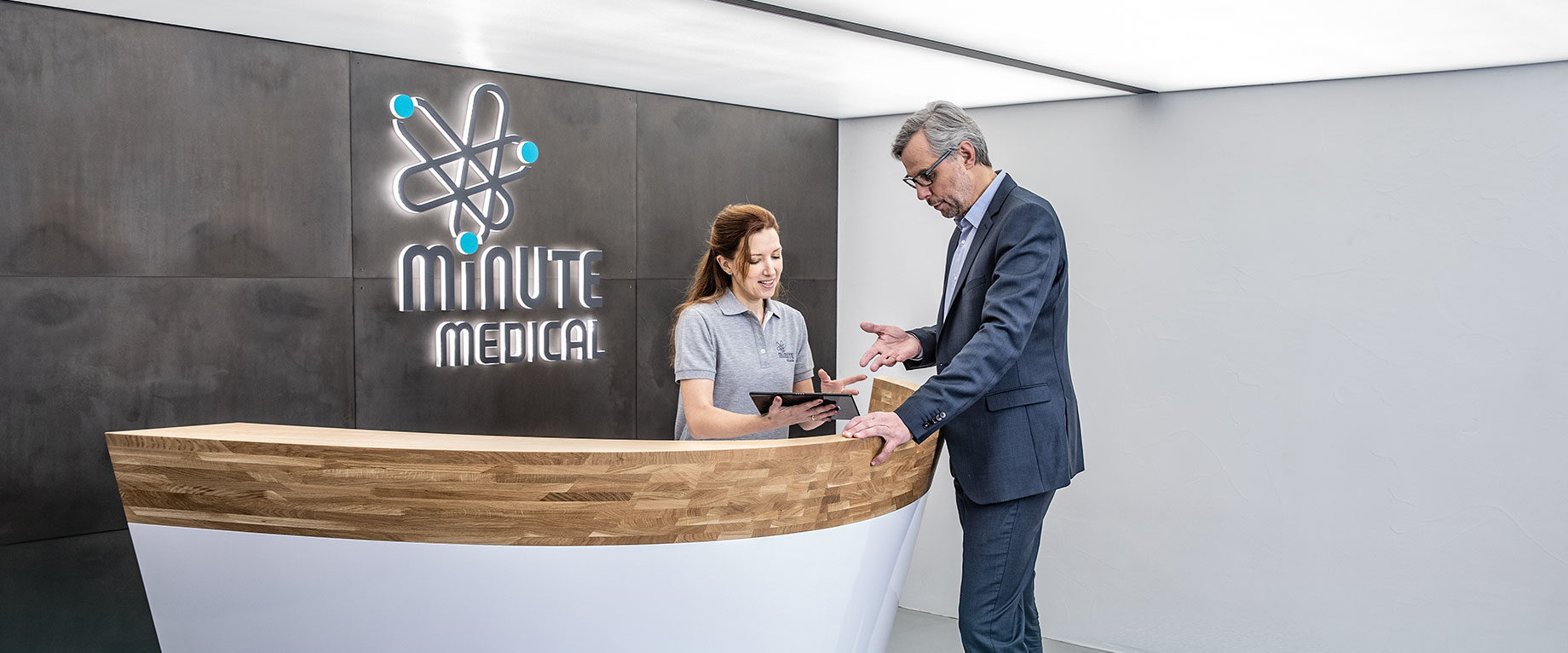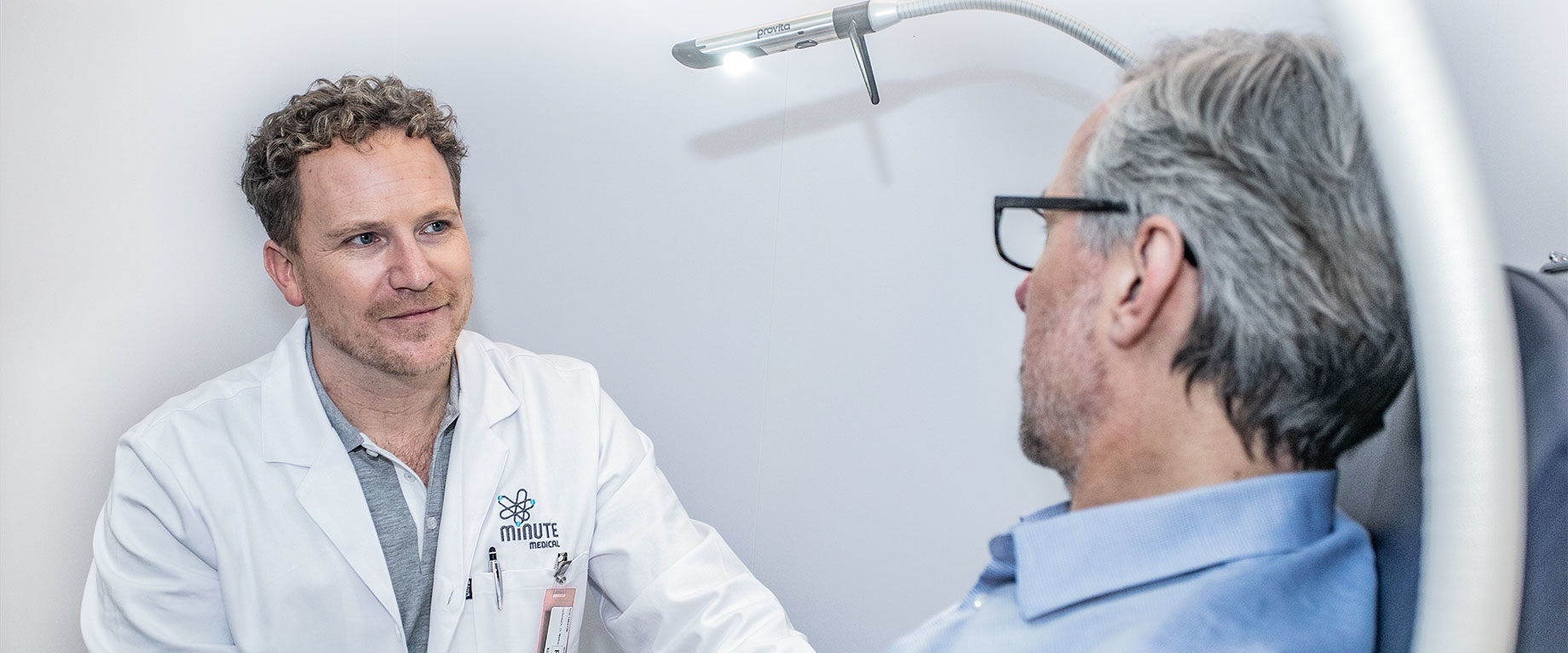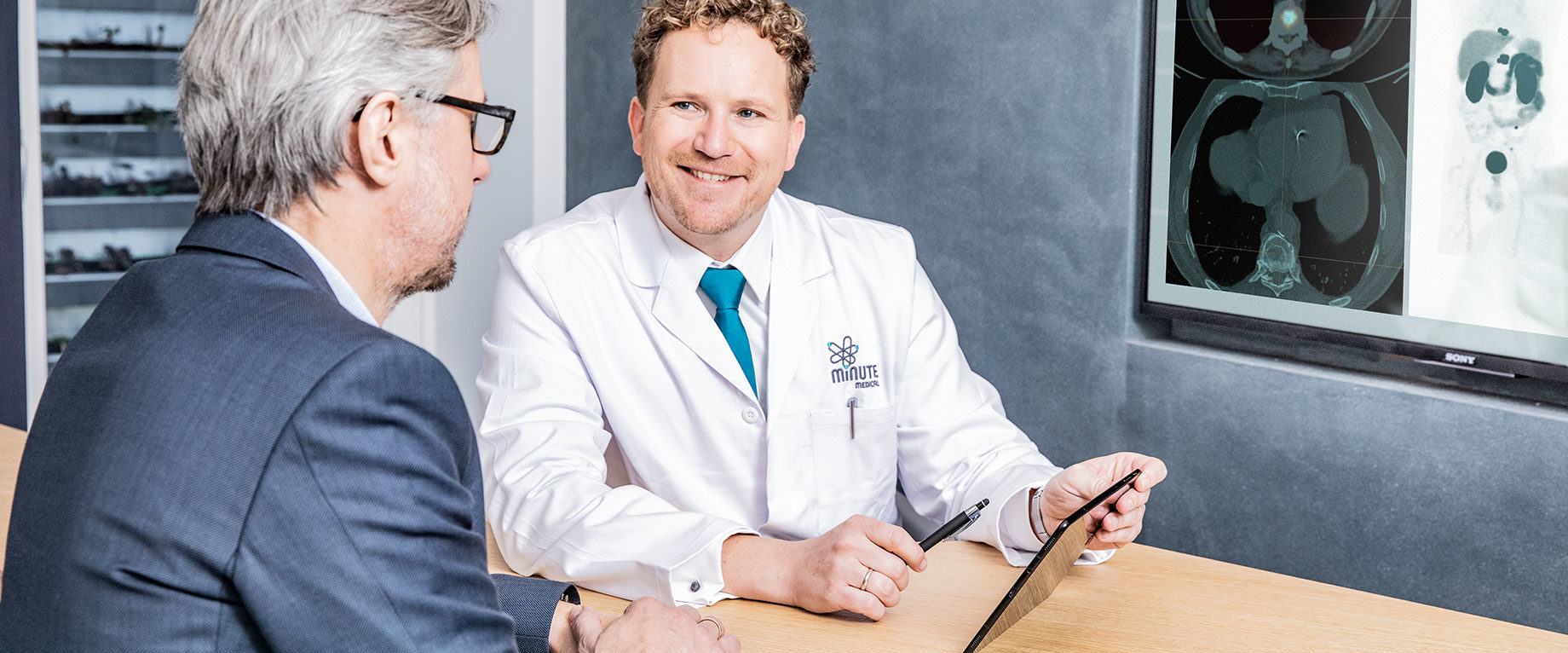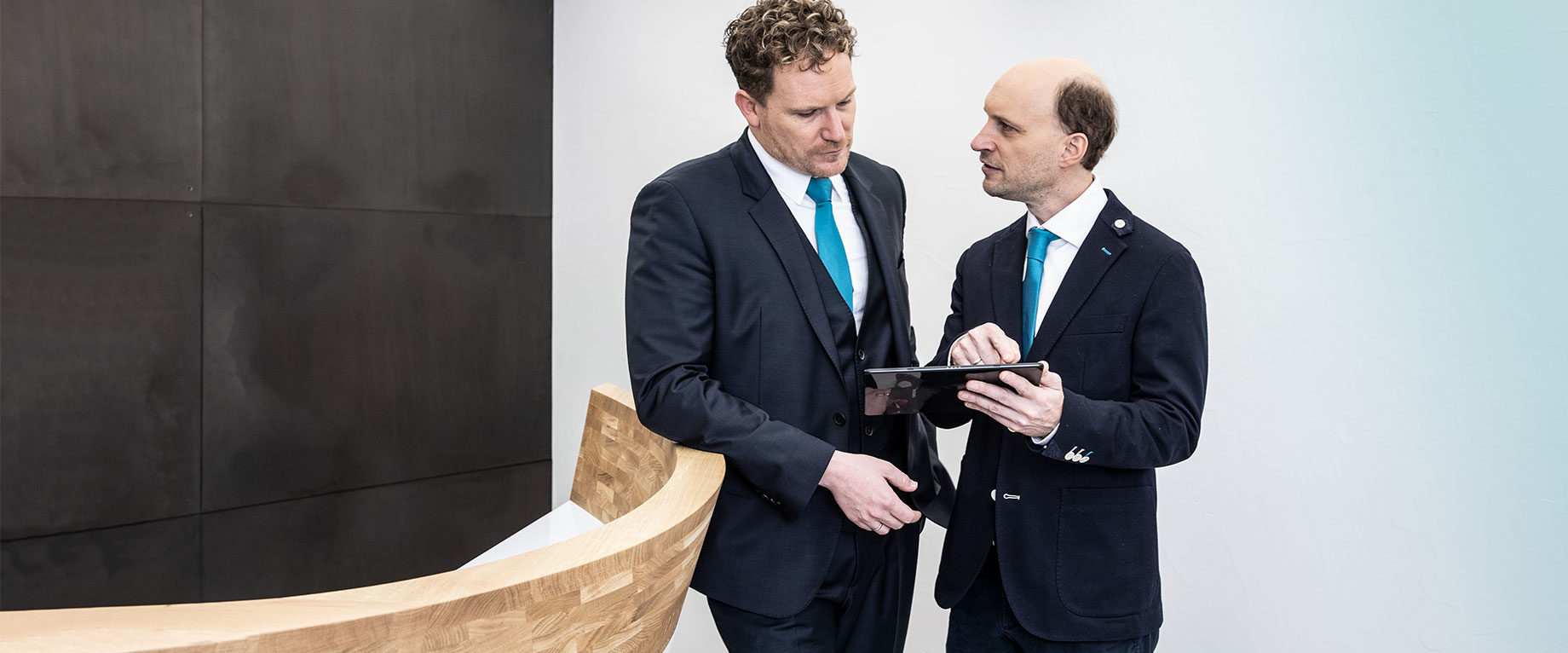Interview with a patient
Interview with a patient, September 2022
Dr. Hartenbach conducts an interview with a patient about his experience with the radioligand therapy 177Lu-PSMA. The patient A.G., 72 y.o., a molecular biologist himself, was diagnosed with metastatic prostate cancer in September 2018. After the conventional standard-of-care treatment (chemo- and antihormonal therapy) there were still residues of the primary tumour in the prostate, and lymph nodes and bone metastases. Up to date he has gone through 9 sessions (3 cycles) of 177Lu-PSMA therapy in the course of three years, initiating a new cycle once a routine control 68Ga-PSMA PET/CT detected PSMA expressing cancer lesions. The therapy has been extremely successful for A.G.: high response and hardly any side effects. Targeted radioligand therapy brings us much closer to the goal of making prostate cancer just another treatable chronic disease, at the same time preserving a decent quality of life, much like e.g. diabetes.
- [00:45] Can you tell us about your prostate cancer diagnosis and the first steps you took? How did you perceive the limitations of standard-of-care therapies and what made you look for alternatives?
- [06:13] How would you compare the side effects and effectiveness of radioligand therapy to standard-of-care treatments?
- [10:07] What is your personal experience with side effects like xerostomia or kidney issues after multiple radioligand therapy cycles?
- [12:00] The importance of the combined treatment approach, including hormonal therapy and carbon ion radiation.
- [15:44] What has helped you personally to cope with the disease and stay optimistic about the future?
Prof. Markus Hartenbach (MH): Hello and welcome to Minute Medical. My name is Markus Hartenbach and today we have a special guest here who's willing to give an interview. Professor Dr. Alexander Von Gabain, renowned microbiologist, founder, entrepreneur and much more. And we really appreciate that he's giving that interview today. Hello, Alexander.
A.G.: Hello, Markus. I'm looking forward to this interview and it's a pleasure for me to support you with what I have learned during the course of my disease and its treatments.
MH: Yes, we really appreciate that, Alexander. So you are not here as an analytical scientist. You are more here now because four years, pretty much exactly 4 years ago, there was a diagnosis that you were confronted with and maybe you can talk a little bit about what it was and what were the first steps.
A.G.: Well, I have been diagnosed indeed four years ago with an advanced prostate cancer with metastases in bones and in a number of lymph nodes. And being a molecular biologist and having worked by myself in oncology, I was aware that this will change my life upside down. It is a shocking experience and in the beginning you have life fear, and as a result, you lean on colleagues who are established and renowned. And I have to say, I was getting good treatment in a university hospital. The dilemma has been that the doctors, maybe also because I am coming from the field, they rather were inclined to implement for me the standard-of-care treatments. The standard-of-care treatments is of course suppressing of testosterone, nicely named by our colleagues as castration or chemical or really physical castration or also in sequence or together with a chemotherapy. And I have gone through this and there was some achievement.
But in honesty, you could still see in my body spreads of the original tumor and also the original tumor was still in the prostate. So this was quite a learning curve. And I have to say what I have learned from this curve is standard of care therapy is important and it's good. But as soon as you are breathing out and you see it's my cancer and it's my life, you have to see what else is on the way. And I was lucky to learn by accident, but also by systematically asking around in the circles of my colleagues and friends, that there are already the next generation treatments coming up. And I always see it through the eye classes of a molecular biologist. The chemotherapy and the hormone suppression therapy I have gone through was clearly still a medicine of the 20th century, but not of the 21st century. Why? I mean, they clearly hit the tumor, but they are far from being specific.
Take chemotherapy. Of course it's blocking most fast-growing cells, so it will block the cancer, but it also has partially very severe side effects on other tissue in your body which is dividing based on dividing cells.
Suppressing the hormones in itself is OK, but I think it's not specific. It also is taking away the testosterone for other functions where they are needed in your body for natural function.
So this learning curve was basically the kickoff point to find other therapies. And interesting, I came across and this is maybe a good thing about the prostate cancer. It has the most specific diagnostic method to discover tumor or tumor metastases in the body, namely by a specific molecule which binds to a surface structure of prostate cancer cells. And if you add the label on, for example, a radio label, you can identify wherever in the body there are still spreads of your cancer. And while I was going through this procedure several times and seeing that the treatments in part improved my conditions. I said, gee, if this is so specific to discover specific residual cancer cells in your body, there must be also a therapy which is based on this specificity. And that's when I met Markus and it wasn't quite an accident.
I heard about him through many sources and Markus explained to me that science has not been resting and I think they have been making this key molecule which is binding so to say to these receptors on the surface of prostate cancer cells by adding something on, you call this a magic bullet, which gives tougher radiation. But compared to the other treatments I have gone through, it is very, very specific. It only destroys cells where you have cancer cells which bind to the ligand and the ligand in the backpack has this radioisotope which is destroying the cancer cells. So that's just the story which I would say to give in short. But now we should not go into the depths.
MH: Yes, this is our theranostics approach which is providing a diagnostic tool with a PSMA ligand PET CT and then of course the therapy with lutetium- or actinium-labeled PSMA which is directly targeting the cells. This is what you what you mentioned. Maybe you can also give an outlook on the comparison between the standard-of-care therapies you had which were successful lowering PSA also killing metastasis in your body. But from the side effect profile, you have now undergone 9 sessions of lutetium PSMA therapy over the past three years, and the last therapy you had in April 2021, which is now 1 1/2 year ago. So also in case of long-term side effects, because now you are 1 1/2 year after your last of nine sessions, maybe you can give a little outlook and comparison of these therapies.
A.G.: Yeah, before I come to this, let me stay one more time with the standard-of-care treatments I have gone through. They indeed had, I would say, nearly unbearable side effects. I have to be honest, at some time during my chemo it I was even so exhausted I could not even go downhill. So not to talk about uphill. so but if you explain this as a molecular biologist, it's clear because you are hitting so many innocent body cells, I think, which so to say, lead to your bad conditions.
So this method just described by Markus has this high specificity. And I think this is maybe the amazing thing is that um the follow-up treatment which was proposed to me by my colleagues in this academic hospital was surgery plus radiation with radio beams and they were trying to explain to me that still see several herds of cancer cells in my body that could with two methods so to say to improve my condition. And I in this situation, facing further unspecific treatments because surgery as well radiotherapy can never so precisely hit the tumor herds in the body, as I think this just described method which I have gone nine times through and I have to say, to give the plain answer, I nearly did not have any severe side effects. As a matter of fact, I was still functioning. Markus is my doctor, also my coach sometimes. He encouraged me to continue my very active professional life. So I was not, so to say, calling off my board seats in a variety of interesting academic institution and companies. And I could do this even while I was getting this treatment. And I think this for me was a hallelujah experience because I started to move into molecular biology, I think by now, nearly more than 45, 48 years ago. And I think my first teachers belonged to the pioneers who have been deciphering the DNA and finding the first protein-protein interactions and explaining how cells are functioning. And I said gee, this knowledge has now really reached the patient. It really protects you in that it really kills only and mostly cells which are really affected by the cancer or cancerous cells. There are some other tissues in the body which also are a challenge. I think this is clear, but I have to say they have not given me any handicap. And I have to say so far I can say the only real measurable side effect that you are a bit tired. But I think any type of treatment gives you a tiredness, even if you're taking antibiotics.
MH: Maybe we can focus a little bit on that because most of the patients are afraid of the described and known side effects of radioligand therapy concerning dry mouth, xerostomia, and sometimes you have the feeling that it's a little bit exaggerated in the literature about xerostomia and dry mouth. What is your experience on that after so many cycles? In the literature we only have up to six cycles described. And we have treated patients over the past decade and never seen here in Vienna real xerostomia, real dry mouth also concerning the kidneys because it is in the kidneys, the PSMA complex, these are the known and described organs also with PSMA expression. What is your experience on that?
A.G.: My experience is that I have not really suffered from, I think, the condition of dry mouth until now, nor any problems in that regard. My kidneys, they show some weaknesses, but I'm convinced they come from other treatments that I've been taking, which would be a little too long here to explain this in detail. But I can say that the real well feeling and being during the therapy and after the therapy is so residual that you can almost lead even during the therapy time, not to talk afterwards anyway, you are not impeded in functioning in your private and also in your professional life. And I think this is very important because if you have cancer, this is a very important part of life quality I think that you continue with your normal life as much as possible.
MH: And what was also very important in your approach was the combined approach. And we always want to point out that not only the radioligand therapy is a standalone therapy. In your case you started with the conventional approach. We also had to the combination over all the time with the antihormonal, also third generation antihormonal treatment. And as a last treatment we also had the carbon ion targeted radiation which is also very precise. So in the end, I think this combination was the key to success.
A.G.: Yes, and by that I like to encourage, so to say, people who come into the same severe life situation as I have been, so to say, sliding in. If you take the choice of new treatments, it's also a gain in time. And by the time before I did the radioligand therapy, there were only, as Markus has mentioned, the 1st and 2nd generation, you can say, hormone receptor blocking treatments, so to say, in the medical community. And I think some of them only you can take by taking at the same time 50 milligram of cortisone. I mean they have, they have and they had really strong side effects and I think the time gain I had with this treatment made me luckily coming into so to say qualifying for the third generation of testosterone receptor blocking agents. And I have to say I take this now as an adjuvanted treatment. And again, I say it has something to do with molecular biology. Scientists have not been sleeping. The third generation, I think, apolutamide or darolutamide, they are much more specific than the first two generations. And so they are also for me with side effects, much more tolerable. And what Markus has mentioned too, I had and I keep my fingers crossed it was still like this, still some residual tumor herds in my prostate. And we thought that it would be good also to use a technology which is really bombarding my prostate but saving as much as possible the surrounding tissue like the rectum and the urine bladder. And this is with this carbon neuron radiation. And it is the same. I mean this is now not molecular biology, but I would say it is the chemical or physical chemical specificity of the nature of the radiation is a great improvement for that type of disease because you hit the prostate much more specifically than with the classical treatments with using X-ray radiation where you almost normally also harm a bit your urine bladder and I think often very strong in your rectum.
MH: Yeah, in your case it worked greatly, and I think in many other patients as well. The data is also showing that and of course you were always very well informed, also on a scientific level. But I also want to encourage the patients, ask for different therapies, for next generation therapies and only the patient that is well informed is the patient that will receive then the best treatment. As a last question and maybe then also as an outlook, it's more a personal question. I mean what was your secret, your personal secret, how to deal with it, your disease, in the past and now also for the future? And what is it that is making you look positively into the future.
A.G.: Well, I have to say I look into the future, and I look forward, and I'm aware with my disease this needs also to some degree good luck. But I guess anyway the most important thing is that this learning curve and being guided that specific interactions of the treatment agents and the treated cells have been really entering the field and improving the treatment. And what Markus just has been stating, there's an interesting study out which is saying, and this is a good thought experiment, if you overnight would take in let's say the societies which can afford this the next generation treatments, not only for prostate cancer, also for diabetes or whatever, you would not only save the healthcare systems of the societies a lot of money, but you would prolong life substantially of the people who are affected by those diseases. So it is a calculation which has been done. And the dilemma is that often through the back door, the next generation treatments are so to say coming in. But the standard-of-care is sometimes also a bit like, I would say, an impediment or almost like a prison for the thoughts. For the doctors, for the scientists, but also for the patients. And I think what I have seen in my case, taking the specificity as a guideline (I am, of course, privileged, I can understand this) I saw more and more at least I have a path which can protect me as long as it is possible. And that really gives me a lot of strengths and I think of course not only to talk about science and molecules and my treatment, as I should say, I have a family which supports me strongly and I have also got strong support by Doctor Hartenbach. I should say in this instance I call him not only a friend but also a coach in making the right decision. Also in my personal life, encouraging me to continue to lead a normal life.
MH: Very nice words. Thank you very much Alexander for your time and maybe for the future and for next generation therapy, we also have our fibroblast-targeted imaging and possibly therapy for the future. So the story is going on and life is going on. And thanks a lot for all these words and your time.
A.G.: It was a pleasure.






